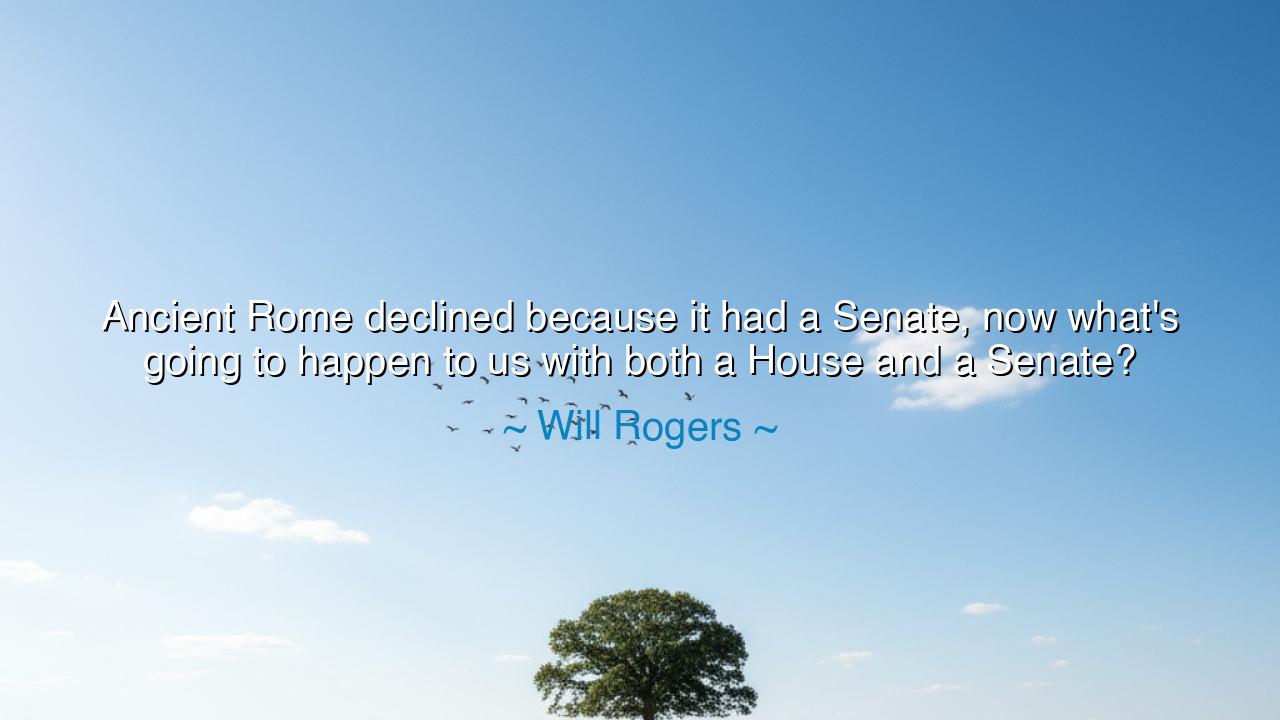
Ancient Rome declined because it had a Senate, now what's going
Ancient Rome declined because it had a Senate, now what's going to happen to us with both a House and a Senate?






"Ancient Rome declined because it had a Senate, now what's going to happen to us with both a House and a Senate?" Thus spoke Will Rogers, the great American humorist, whose wit flowed not from mockery but from wisdom wrapped in laughter. His words, delivered with a smile, hide beneath them a deep and enduring truth — that the slow decay of republics often begins not with invasion or disaster, but with the failings of their own institutions. With this jest, Rogers casts his keen eye upon the machinery of government and, through humor, delivers a warning as old as civilization itself: that when those chosen to lead cease to serve, when debate turns to division and self-interest rules the halls of power, the fall of great nations begins.
Rogers, who lived through the turbulence of the early twentieth century — wars, depressions, and political upheaval — was not a cynic but a lover of democracy. He saw that the strength of America lay not in its wealth or armies, but in the character of its people and the integrity of its government. Yet he also saw how bureaucracy and endless partisanship could twist that strength into weakness. His jest about Rome and the Senate was not merely a joke about inefficiency — it was a reflection on history’s cruel pattern: that once-great republics, when consumed by corruption, vanity, and endless talk, become hollow empires waiting for collapse.
In ancient Rome, the Senate had once been the heart of the Republic, the chamber where the voices of noble citizens debated the fate of the world. But as centuries passed, its purpose decayed. Senators became servants of ambition, masters of rhetoric rather than virtue. They quarreled not for truth, but for power. While they spoke of the “good of Rome,” they enriched themselves and weakened the very state they claimed to love. The result was not swift destruction, but slow erosion — the steady crumbling of civic duty until Caesar’s rise became inevitable. Rogers, gazing upon the politics of his own day, saw the same seeds — and in jest, he planted a warning: if Rome fell with one Senate, what dangers await a nation burdened with two chambers equally prone to pride and paralysis?
The meaning of Rogers’s words runs deeper than satire. He reminds us that institutions, no matter how noble their design, cannot preserve a nation if those within them forget their purpose. A House and a Senate may serve liberty, but only when those who inhabit them serve the people rather than their own ambition. When debate becomes endless noise and compromise a forgotten art, governance transforms from service into spectacle. And when the people, weary of the spectacle, turn away in disgust, the republic begins to rot from within. Rogers understood that laughter could pierce hypocrisy more sharply than anger — that through humor, he could awaken conscience.
Indeed, history bears out his warning. In the last days of the Roman Republic, Cicero — the greatest orator of his age — lamented that eloquence had replaced action, and that the Senate debated while Rome burned in its own corruption. Centuries later, the same pattern reappeared in the dying days of monarchies and democracies alike: the leaders spoke of principle while serving privilege, and the people, disillusioned, surrendered their power to strongmen who promised to restore order. Rogers saw that danger lurking even in America’s halls of power — not in tyranny from above, but in apathy from within.
Yet Rogers’s wisdom is not a lament, but a call to awareness. His humor does not mock democracy; it defends it. He reminds us that laughter can be the beginning of reform, that to see folly clearly is the first step toward correcting it. If the House and Senate symbolize division and delay, then the cure lies not in destroying them, but in rekindling the spirit of service that once made them great. Rogers’s wit is the laughter of a patriot — one who loves his country enough to tell it the truth.
The lesson, then, is this: the health of a republic depends not on its laws or chambers, but on the virtue of those who dwell within them. The people must demand honesty, wisdom, and humility from their leaders — and from themselves. Let citizens never grow so cynical that they withdraw, nor so trusting that they forget to hold power to account. Engage in the life of your nation; question without hatred, and serve without pride. For no Senate, no House, no government can stand long when the people cease to care who governs them.
So remember the laughter of Will Rogers, which was, in truth, the laughter of love for liberty. His jest about Rome was not mockery, but prophecy — a warning that every age must heed. The fall of empires begins with indifference, but their renewal begins with awareness. Let the House and Senate be not symbols of decline, but of conscience restored — where debate serves truth, and where the will of the people, not the vanity of politicians, rules. For if we heed Rogers’s wisdom, our laughter will not echo the fall of Rome, but the rebirth of freedom.






AAdministratorAdministrator
Welcome, honored guests. Please leave a comment, we will respond soon